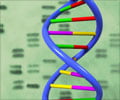A molecular security system in human cells that deactivates and degrades foreign DNA has been discovered by University of Minnesota researchers.
A molecular security system in human cells that deactivates and degrades foreign DNA has been discovered by University of Minnesota researchers. This is a feat that could pave the way to major improvements in genetic engineering and gene therapy technologies.
Led by Dr. Reuben Harris, the researchers showed how APOBEC3A, an enzyme found in human immune cells, disables double-stranded foreign DNA by changing cytosines (one of the four main bases in DNA) to uracils (an atypical DNA base).Persisting DNA uracils result in mutations that disable the DNA.
In addition, the authors show that other enzymes step in to degrade the uracil-containing foreign DNA and sweep its remains out of the cell.
"Scientists have known for a long time that some human cells take up DNA better than others, but we haven't had good molecular explanations. This is definitely one of the reasons. Foreign DNA restriction is a fundamental process that could have broad implications for a variety of genetic diseases," Nature quoted Harris as saying.
Knowing how the mechanism works, scientists can develop ways to manipulate it to enable more effective methods to swap bad genes for good ones.
Harris also wants to learn why the mechanism doesn't affect a cell's own DNA.
Advertisement
Once bacterial DNA restriction enzymes were understood, their power was harnessed to cut and paste segments of DNA for a wide variety of therapeutic and industrial purposes.
Advertisement
Source-ANI
RAS









